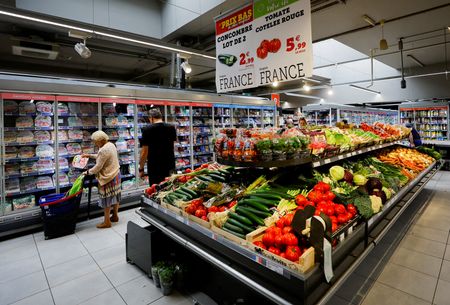LONDON (Reuters) – Euro zone business activity declined for a fifth month in November, suggesting the economy was sliding into a mild recession as consumers cut spending amid surging inflation, a survey showed.
S&P Global’s final composite Purchasing Managers’ Index (PMI) for the euro zone, seen as a good guide to economic health, nudged up to 47.8 in November from October’s 23-month low of 47.3, matching a preliminary estimate.
Anything below 50 indicates contraction.
“A fifth consecutive monthly falling output signalled by the PMI adds to the likelihood that the euro zone is sliding into recession,” said Chris Williamson, chief business economist at S&P Global Market Intelligence.
“However, at present the downturn remains only modest, with an easing in the overall rate of contraction in November means so far the region looks set to see GDP contract by a mere 0.2%.”
Economists gave a median 78% chance of a recession in the bloc within a year in a Reuters poll last month and predicted the economy would contract 0.4% this quarter.
With demand falling again and scant prospect of an imminent turnaround firms scaled back on hiring – the employment index slipped to 51.8 from 52.5. Unemployment in the region dipped to 6.5% in October, official data showed on Thursday.
A PMI covering the bloc’s dominant services industry nudged down to 48.5 from 48.6, its lowest reading since early 2021 and below the preliminary 48.6 estimate.
Still, the input and output prices index both fell suggesting inflationary pressures may have already peaked, likely welcome news to policymakers at the European Central Bank. The output prices index was a 3-month low of 62.3.
Inflation in the bloc was a lower-than-expected 10.0% in November, official preliminary data showed last week, still five times the ECB’s 2% target.
The central bank has been raising interest rates to try and tame price rises and is expected to add another 50 basis points later this month.
“With the surveys also bringing signs of inflation having peaked, the headwind on demand from rising prices should also start to ease in coming months, barring severe weather over the winter, hinting that any recession may be both brief and relatively mild,” Williamson said.
(Reporting by Jonathan Cable; Editing by Toby Chopra)

